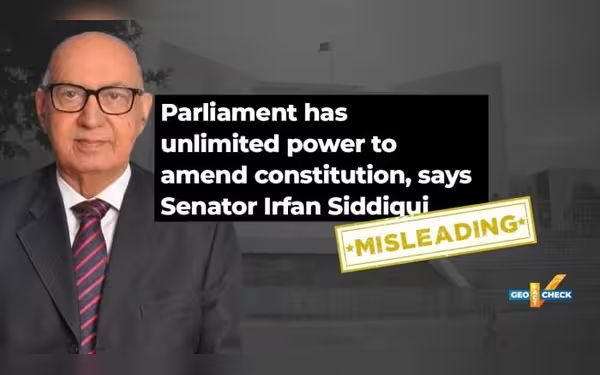Friday, October 4, 2024 08:23 AM
Senator Irfan Siddiqui's Misleading Claims on Parliament's Power to Amend Constitution
- Senator Siddiqui claims no limits on parliament's amendment power.
- Legal experts dispute claims regarding judicial review of amendments.
- Supreme Court ruling emphasizes checks on constitutional amendments.
 Image Credits: geo
Image Credits: geoSenator Irfan Siddiqui's claims on parliament's amendment power face legal scrutiny and contradict established judicial precedents.
In recent discussions surrounding the powers of the parliament in Pakistan, Senator Irfan Siddiqui of the Pakistan Muslim League-Nawaz (PML-N) made a bold claim regarding the parliament's authority to amend the Constitution. During a press briefing on September 25, he asserted that there are no limits to this power and that any amendments made by parliament cannot be challenged in court. This statement has sparked significant debate and raised questions about the interpretation of constitutional law in Pakistan.
Senator Siddiqui referenced Article 239(5) of the Constitution, which states that no constitutional amendment can be questioned in any court on any grounds. He argued that this provision implies that amendments, such as the 18th Amendment, should not be subject to judicial review. However, legal experts and a former Supreme Court judge have countered this assertion, emphasizing that there are indeed restrictions on the parliament's power to amend the Constitution.
According to Islamabad-based lawyer Salaar Khan, the Supreme Court addressed this very issue in a landmark 2015 ruling in the case of District Bar Association (Rawalpindi) v. Federation of Pakistan. In this case, the court examined the constitutional validity of the 18th and 21st amendments. Khan explained that the court concluded that while amendments can be made, they cannot violate the Constitution's essential features. If an amendment does infringe upon these features, the court retains the authority to annul it.
Another legal expert, Salahuddin Ahmed, echoed Khan's sentiments, stating that the Supreme Court has established that constitutional amendments can be challenged if they exceed the parliament's amendatory power and threaten the basic structure of the Constitution. This includes fundamental principles such as federalism, parliamentary democracy, and the independence of the judiciary.
Faisal Arab, a former Supreme Court judge, further clarified that certain basic structures of the Constitution must be preserved. He provided a hypothetical example: if parliament were to pass an amendment allowing general elections every ten years or granting lifetime tenure to parliament members, such changes would disrupt the Constitution's basic structure, warranting judicial intervention.
The 2015 ruling was significant, with a majority of 13 out of 17 justices affirming that the court has the power to strike down constitutional amendments that alter or abrogate the Constitution's salient features. This precedent underscores the importance of maintaining the integrity of the Constitution and the checks and balances inherent in Pakistan's legal system.
While Senator Siddiqui's remarks may reflect a particular interpretation of parliamentary power, they do not align with established legal precedents. The Constitution of Pakistan is designed to safeguard its fundamental principles, and the judiciary plays a crucial role in ensuring that any amendments do not undermine these core values. As citizens, it is essential to remain informed about these discussions, as they directly impact the governance and democratic processes within the country.













